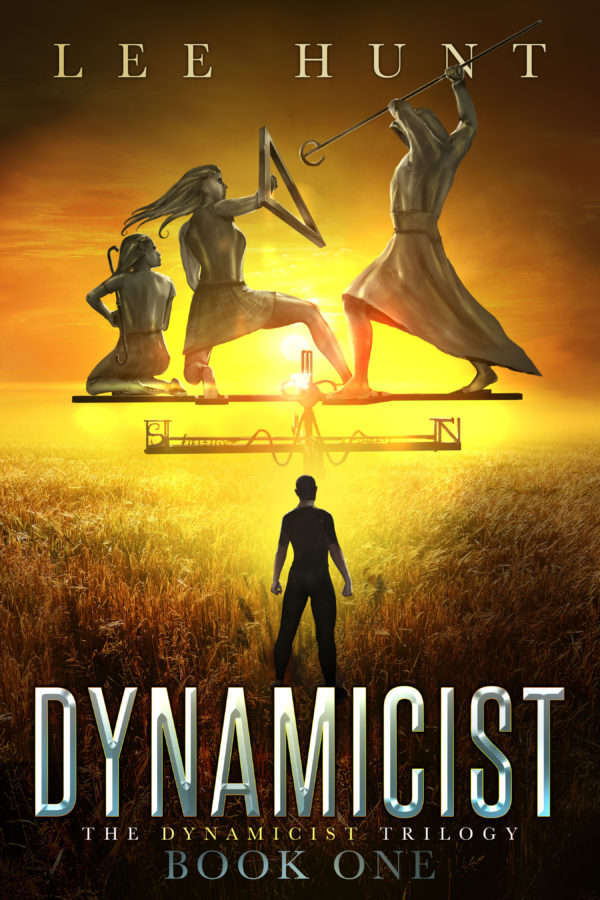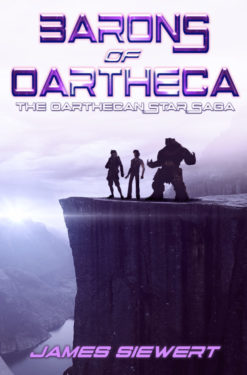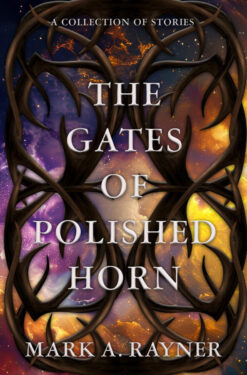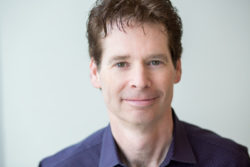The Dynamicist Trilogy Book One
by

Would it kill you to create something genuinely new? In Robert's world, it used to. Supernatural vengeance for invention is now a thing of the past.
Young, optimistic, quick of mind and quick to act, Robert thinks being invited to the New School is an invitation to change the world. But change is difficult when there is no history of innovation.
He is initially successful in his studies, but nothing is as simple as he naively imagines. His classmates confuse and frustrate him. One is a drunk, while another two constantly stalk him. Is it for love or something more sinister?
Robert's optimism is further tested by protestors who circle the campus, decrying the newly invented breed of grain. They claim it is poison and that the New School should be punished by Nimrheal, the god who formerly murdered inventors. Robert suspects foreign business influences are behind the protests, but he quickly finds that investigating their cause is dangerous.
Robert's most difficult challenges are his unresolved childhood issues. His mother died while he was a child. Robert's formative helplessness and inability to remember her face projects into a powerful and blinding protectiveness towards all women. When a campus assault pushes Robert over the edge, his hopes of even staying at the New School are jeopardized. He cannot aspire to change the world if he does not even know himself.
At the same time as Robert struggles on campus, a powerful, ruthless and emotionally closed man known only as the Lonely Wizard journeys across an empty wilderness to return home. As Robert and the Lonely Wizard move closer together, Robert finds that instead of entering a golden era of invention, he may instead be on the brink of a cold war and an endless, unchanging dark age.
- 1 Read list
Publisher: Independently Published
Editors:
Cover Artists:
Genres:
Tropes: Farmer to Hero, Humanity is Dangerous, Prophesy
Word Count: 105,000
Setting: The World of Dynamicist
Languages Available: English
Series Type: Continuous / Same Characters
Tropes: Farmer to Hero, Humanity is Dangerous, Prophesy
Word Count: 105,000
Setting: The World of Dynamicist
Languages Available: English
Series Type: Continuous / Same Characters
Wendy Ross on Amazon.ca wrote:In this fantasy debut, a young farmer attends an elite school for those skilled in manipulating the laws of thermodynamics.
Eighteen-year-old Robert Endicott of Bron has been chosen for Duchess Lady Brice’s “Applied Mathematics and Physics” program at the New School. Though his parents are dead, Robert lives with loving grandparents. Finlay, his Grandpa, experienced a “heraldic” dream that confirmed the teen would be accepted and so he moves to Vercors, the capital. Uncle Arrayn escorts Robert on the journey, and they stop in the town of Nyhmes, where the teen witnesses grain futures exchanged and ponders the advantages of his Grandpa's heraldry. In Vercors, two young women threaten to steal his baggage. They are Eloise Kyre and Koria Valcourt, fellow classmates at the New School, who only tease him. On campus, Robert meets dorm mates Davyn Daly, Lord Gregory Justice, and Heylor Style, among others. While he hopes to enjoy a forward-looking career as a student and innovator, Robert nevertheless becomes embroiled in his classmates’ questionable behavior. He discovers quickly that one of them is a compulsive thief and another, a misanthropic drunk. One night, a student is sexually assaulted, and the fallout threatens to derail the program. The upside to this chaos is that Robert falls in love with Koria, who reciprocates. There’s little danger, it seems, that he’ll become like the title character of his favorite book, The Lonely Wizard. Hunt’s series starter offers a grounded, scientifically detailed answer to the Harry Potter universe. “Wizards and dynamicists do the same thing,” instructor Keith Euyn says. “One has an intuitive, spontaneous gift, the other a managed, quantitative process.” This premise makes for occasionally dense prose that genre fans may need patience navigating. The most captivating plot element, murmuring in the background, is that of Nimrheal, a supposedly vanquished demon who kills those who innovate. Extensive flashbacks sometimes disrupt the tale’s flow, like the one immediately following Eloise and Koria’s introduction. But narrative hiccups are balanced by excellent lines like “Perhaps people would rather the world was changed than change themselves.” A disturbing heraldic dream ably sets up the sequel.
A philosophically minded series opener that deftly merges science, fantasy, and college life.
Wizarding in a Dark Age of Danger and Duality
Reviewed in Canada on September 19, 2020
Verified PurchaseIf you relished Rowling’s Harry Potter Series and its world of school-age wizardry and also delved into Grossman’s darker yet clever The Magicians Trilogy, then consider picking up Hunt’s fresh take on a group of college-age cohorts being schooled as a new breed of wizards called dynamicists. What’s a dynamicist you ask? Well, for one thing they don’t use wands. Hunt says,“Let’s consider this: wizards and dynamicists do the same thing. They manipulate the empyreal continuum to change probability, rearrange or borrow energy, or perceive the future and occasionally the past. …the wizard does these things through what is essentially an instinctive sense of feel. A dynamicist does them through a mathematical framework. The what is essentially the same, but the ‘how’ is very different.”
Hunt worked professionally as a geophysicist and puts his mind-bending twist on creating a neo-knightly mythology nested within a retro-rural setting all encompassed by this nerdy fantasy world where an unintentional slip of skill can unleash catastrophic cosmic energy and its deadly consequences.
Inherent in this world of wizarding vs. dynamicist methodologies is the theme of duality, generally the polarization of the subjective vs. the objective, but more specifically the dichotomy of intuition vs. reason or whether a student can impulsively intuit an outcome or arrive at the same outcome through careful mathematical deduction and live to tell the tale. We are told that those dynamicists who can do both are the true geniuses. Throughout the book Hunt plays with the ideas of ethics and the shifting boundaries between lies and truth, stasis and change, steady-state and chaos, predictability and risk, and math and narration to name a few.
It’s intriguing that Hunt uses different fonts to offer the reader stories within stories. Events are retold from various characters’ points of view, revealing the possibility of unreliable narrators, questionable content, emotional indulgence, and egoic embellishments – possible fake news, if you will. Italics are also employed to help Hunt escape from the constrictions of third person narration. This alerts readers to the protagonist’s first- person thought processes, much the way Shakespearean plays use the aside device to reveal short, personal reactions directly to the audience. A striking touch.
In a subtle way, there is a thread of mysticism that runs through the book. Standing by a slough at age 3, Robert has a powerful zen-like experience of “no-mind”: that fleeting feeling of intense presence, stillness, and oneness with the universe where the mind is in perfect balance and all struggles, anxieties, and pressures are released. It will be interesting to see how Hunt develops the idea that intuition or reason can take his college-age characters to this place of oneness, different journeys to the same pinnacle outcome of mastery through self-knowledge. Much like the alert focus needed in extreme sports.
Protagonist Robert Endicott appears to have a savior complex due to early childhood trauma experienced at a moment he was experiencing this deep presence and oneness with the natural world. Like Anakin Skywalker in Star Wars his feels impelled to save those he loves even when faced with the risk of danger and death. But perhaps a more fundamental analogy can be drawn with Dr. Jack Shephard, the main protagonist in the TV series Lost. He was a leader, a man of science, and the antithesis to a man of faith in the beginning of the show. However Jack’s need to save everyone became an obsession. It will be interesting to see what path Robert’s story arch takes him down – man of reason vs. man of intuition.
If you happened to be a math wiz or physics major in college, you’ll enjoy this romp through the polarities of intuition vs. reason. But for all readers alike the novel spins stories within stories, develops memorable characters, contains heartwarming humor, poses ethical questions, creates a battle between stasis and innovation, and cloaks it all in a brooding mystery. I’m left asking who actually is the “Lonely Wizard” and why all the fuss and foment about the “grain”? It’s a rewarding reading experience; I look forward to the next sequel Herald and delving further into these questions and observations!





